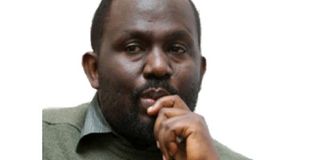This is how a Muntu ‘third way’ party could succeed or fail

CHARLES ONYANGO-OBBO
What you need to know:
- Political party. The closest I can think of the kind of party Gen Muntu might build, is South Africa’s ANC as at 1990, or Kenya’s National Rainbow Coalition (NARC) in 2002.
- In ANC, some just wanted to end the apartheid regime, but didn’t like the “rainbow nation” idea that Nelson Mandela favoured.
- In NARC, many wanted to end Daniel Arap Moi and KANU’s rule, but didn’t want economic or social reforms.
On Monday former Forum for Democratic Change leader, Maj Gen (rtd) Mugisha Muntu, posted on Twitter an announcement that he and like-minded colleagues would begin political “consultations” in Hoima District.
If you proceed from the view that the main political parties are the ruling National Resistance Movement and the opposition FDC, Muntu is seen as seeking a “third way”: A centrist party between the NRM seen as having been disemboweled by President Museveni, and an increasingly militant FDC, which is beholden to Kizza Besigye, although he’s no longer its leader.
There is a belief that a more moderate FDC, will attract middle-of-the-road NRMs, and soft anti-Museveni elements, and create a winning combination.
It is an appealing prospect, except it runs into many problems. Besigye, though no doubt very influential in FDC, is actually not its leader. Those asking to “leave” are effectively asking him to give up his political rights. It is something no other Ugandan politician has ever been asked to do. Indeed, those arguing that Mr Museveni should leave now, after 32 years in power, are offering the incentive of his being able to “influence events” from outside as an elder statesman. But Besigye, is being asked not to do that, but to disappear.
On the other hand, Besigye’s shadow looms too large over FDC.
All this should tell us that Besigye political hold on key opposition constituencies has nothing to do with FDC, but with Museveni. He exists an anti-thesis to Mr Museveni, and as long as Mr Museveni is in power, not even a “third way” party, however moderate and inclusive, will politically disappear him even if he went and hid in his house in Kasangati. In fact, his stature would rise.
It’s not straight-forward, and in his own deliberate manner, Gen Muntu tries to deal with it in the long statement announcing the “consultations”.
He makes the attractive point that anti-Museveni politics that is almost exclusively focused on removing him from power is misguided. That, as Uganda’s and Africa’s history teaches us, if no institutions are built, and if the systemic problems in the country’s economy and social space are fixed, Mr Museveni will leave and we shall see another strongman.
Gen Muntu wants a values-based politics, infused with high ideological purpose, built around tasks like dealing with youth unemployment, and giving young people a stake.
Well and good, except seeking regime change is not necessarily in contradiction with building a more democratic and fair future Uganda.
That’s because of some key changes in our politics. One, it has become all but impossible for any party to represent a generic national constituency. The NRM is now a status quo party, and rallying around Mr Museveni as President for life is really the only way its dominant element knows to protect its privileges.
FDC, and the figure of Besigye, represents those who want to end that. In other words, there is actually space for a regime change party.
However, as the Bobi Wine wave revealed, as the country with the world’s second largest young population, Uganda seems to have arrived at a point where there is a large enough vote to win an election on the two issues of education and economic opportunity for youth. The level of radicalism in this constituency, as we have suggested before, is to the left of FDC.
There are also parts of this country, the far north, far east, and far west, that are so totally alienated from the bigger Uganda and its Kampala-driven politics, they might as well be citizens of a different nation all together.
There are significant groups to which land, culture, the crisis of family, and other spiritual issues are significant. They see NRM as morally bankrupt. FDC as soul-less and out of touch.
There is a significant urban minority, which is globalist, technocratic that thinks Uganda is being held back by tradition, superstition, archaic public institutions and educational system, and parochial nationalism. They want it to be more open to East Africa and the world.
The closest I can think of the kind of party Gen Muntu might build, is South Africa’s ANC as at 1990, or Kenya’s National Rainbow Coalition (NARC) in 2002. In ANC, some just wanted to end the apartheid regime, but didn’t like the “rainbow nation” idea that Nelson Mandela favoured. In NARC, many wanted to end Daniel arap Moi and KANU’s rule, but didn’t want economic or social reforms.
Stitching together these different pieces, always works better than trying to build something new from the ground up. For one, as both South Africa and Kenya’s cases showed us, it allows you to accommodate old regime elements, avoiding the disaster that happened in Iraq where the Americans were dead set on dismantling every bit of Saddam Hussein’s Ba’ath party infrastructure.
Mr Onyango-Obbo is the publisher of Africa data visualiser Africapedia.com and explainer site Roguechiefs.com. Twitter@cobbo3




